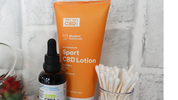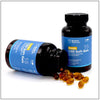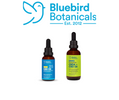Full-Spectrum CBD Oil vs CBD Isolate: Which One Is Right for You?

If you're exploring the world of CBD, with so many options out there, it’s tough to know which one to choose. Full-spectrum CBD oil and CBD isolate are two popular forms, and they each have their own unique benefits. In this article, we'll break down what each one is, how they differ, and help you decide which might be the better fit for your needs in 2025.
Key Takeaways
-
Full-spectrum CBD oil contains various cannabinoids, terpenes, and flavonoids, while CBD isolate is pure CBD without any other compounds.
-
Full-spectrum CBD may provide enhanced effects due to the entourage effect, where all compounds work together for better results.
-
CBD isolate is ideal for those who want to avoid THC completely, making it a safer choice for drug testing.
-
Broad-spectrum CBD is another option that includes multiple cannabinoids but has no THC, offering a middle ground between full-spectrum and isolate.
-
Choosing between the two depends on individual preferences and needs, so consider your own experiences and sensitivities.
What Is Full-Spectrum CBD Oil?
Full spectrum cbd oil is like getting the whole package from the cannabis plant. Instead of just isolating the CBD, this type of oil keeps all the other good stuff that's naturally in there. Think of it as less processed and closer to how nature intended it.
It includes things like:
-
Other cannabinoids (like CBN, CBG, and CBC)
-
Terpenes (which give it flavor and aroma)
-
Flavonoids (antioxidants)
Because it has all these components, many believe that full-spectrum CBD oil provides a better effect than other types of CBD. This is often called the "entourage effect," where all the different parts work together to boost the overall benefits.
It's worth noting that full-spectrum CBD oil usually contains a tiny amount of THC (less than 0.3%), which isn't enough to make you feel high but could potentially show up on a drug test. If that's a concern, you might want to consider other options.
It's made using less processing, and some brands even use mechanical extraction or CO2 extraction to keep it as natural as possible. This means fewer solvents and chemicals are used. Even broad spectrum cbd can be extracted this way.
What Is CBD Isolate?
CBD isolate is the purest form of CBD, derived by removing all other compounds found in the cannabis plant. This includes terpenes, flavonoids, and other cannabinoids, leaving behind almost exclusively CBD. Think of it as CBD in its most unadulterated form.
It's often preferred by individuals who want to avoid any trace amounts of THC, or other cannabis compounds, for personal or professional reasons.
It typically comes in the form of a white, crystalline powder. Because of its purity, it's flavorless and odorless, making it versatile for various applications. You can easily add pure CBD oil to foods, beverages, and even topical creams.
Here are some common forms:
-
Powders
-
Oils
-
Crystals
Full-Spectrum vs CBD Isolate: Key Differences
It's easy to get lost in the world of CBD, especially when trying to figure out what sets full-spectrum CBD apart from CBD isolate. Both come from the hemp plant, but they offer very different experiences. Let's break down the key differences.
-
Full-spectrum CBD contains all the compounds found in the hemp plant, including trace amounts of THC (less than 0.3%).
-
CBD isolate, on the other hand, is pure CBD, with all other compounds removed.
-
The presence (or absence) of these other compounds leads to some important distinctions.
Choosing between full-spectrum and isolate really depends on your individual needs and preferences. Some people want the full range of plant compounds, while others prefer to avoid THC altogether. It's all about finding what works best for you.
Think of it like this:
|
Feature |
Full-Spectrum CBD |
CBD Isolate |
|
Cannabinoids |
Includes CBD, THC (≤0.3%), and other cannabinoids |
Only CBD |
|
Terpenes |
Present |
Absent |
|
Flavonoids |
Present |
Absent |
|
Entourage Effect |
Yes |
No |
|
THC Content |
Up to 0.3% |
0% |
Ultimately, the best choice depends on your individual needs and preferences. Some people find that the entourage effect enhances the benefits of CBD, while others prefer the purity and zero-THC guarantee of isolate. If you are sensitive to THC, then you might want to consider CBD isolate. Full-spectrum CBD products are also popular. Even though full-spectrum CBD tends to contain around 0.3% THC, this is nowhere near enough chemical compounds necessary to get a "high" at the recommended measurement. Some additional cannabinoids in full-spectrum CBD have a potential role in wellness:
-
CBC, CBDV, and CBG are cannabinoids that also have beneficial properties and can support various systems within the body.
-
CBN is another cannabinoid that can potentially support calm within the body
-
Full-spectrum CBD includes naturally occurring plant compounds, including trace nutrients and botanical elements. CBD isolate, while just as effective as full-spectrum CBD, often lacks the nutrients and minerals found in full-spectrum CBD.
Broad-Spectrum: A Middle Ground?
So, you've heard about full-spectrum and CBD isolate, but what if you want something in between? That's where broad-spectrum CBD comes in. Think of it as the compromise candidate in the CBD world. It aims to give you the benefits of multiple cannabis plant compounds without the THC.
Broad-spectrum CBD contains most of the cannabinoids, terpenes, and flavonoids found in the original plant, but it undergoes an extra process to remove the THC. This makes it a good option for people who want to avoid THC altogether but still want to experience the entourage effect, where different compounds work together to boost the overall effect.
Broad-spectrum CBD offers a way to potentially experience the synergistic benefits of multiple cannabinoids and terpenes, without the risk of THC exposure. It's a popular choice for those who are sensitive to THC or have concerns about drug testing.
It's not quite as potent as full-spectrum, since some compounds might be present in smaller amounts after the THC removal. But it's definitely more than just CBD alone, like you'd get with an isolate. If you're worried about failing a drug test, broad-spectrum CBD products might be a good choice.
Here's a quick rundown:
-
Contains multiple cannabinoids and terpenes.
-
THC is removed.
-
May offer an entourage effect, though possibly less pronounced than with full-spectrum CBD.
-
A good option for those who want to avoid THC.
It's worth noting that while broad-spectrum products aim to be THC-free, there's always a small chance of trace amounts being present. Always check the third-party lab results to confirm the THC content before buying. This is especially important if you have strict requirements for THC-free products. Broad-spectrum CBD is a good option for those seeking the benefits of the entourage effect without the THC. It's like having your cake and (almost) eating it too!
⭐⭐⭐⭐⭐
"I have been with Bluebird Botanicals for years now, and cannot recommend highly enough how excellent their CBD Gummies are. Lifelong customer right here!!"
-Alice May
Which One Should You Choose in 2025?
Okay, so it's 2025, and you're still wondering whether to go with full-spectrum CBD or CBD isolate. It's a valid question! The market has evolved, and there are even more options and considerations than before. Let's break it down.
First off, remember that individual needs are paramount. What works wonders for your friend might not do the trick for you. It's all about experimenting and finding what fits your body and lifestyle best. Also, keep in mind that regulations and product availability can shift, so always double-check the latest information from trusted sources.
Choosing between full-spectrum and CBD isolate really boils down to your personal preferences, sensitivities, and what you're hoping to achieve with CBD. There's no one-size-fits-all answer, and it might take some trial and error to find your sweet spot.
Here's a quick guide to help you decide:
-
Consider your sensitivity to THC: Even though full-spectrum products contain only trace amounts, some people are more sensitive than others. If you're worried about even the slightest psychoactive effect, isolate might be a better choice.
-
Think about the entourage effect: Full-spectrum products offer the potential benefits of the entourage effect, where various cannabinoids and terpenes work together synergistically. Some believe this provides a more complete and effective experience.
-
Factor in your specific needs: Are you looking for general wellness support, or are you seeking support to unwind before bed or daily stress? Some people find full-spectrum more effective for certain issues, while others prefer the purity of isolate.
-
Check for third-party testing: Regardless of which type you choose, always make sure the product has been third-party tested for safety and purity. This is crucial for ensuring you're getting a safe and effective product. You can find third party tested CBD products online.
Ultimately, the best way to decide is to try both and see which one works best for you. Start with a low amount and gradually increase it until you find the right balance. And of course, talk to your doctor before starting any new supplement, especially if you have any underlying health conditions or are taking any medications.
Where to Buy High-Quality CBD Oil
Finding reliable sources to buy cbd can feel like navigating a maze. With so many options available, it's important to be discerning and prioritize quality and transparency. Not all CBD products are created equal, and taking the time to research and select reputable brands will greatly improve your experience and ensure you're actually getting the best full-spectrum and isolate CBD oils for your needs.
Prioritize Transparency: Certificates of Analysis (COAs)
A Certificate of Analysis (COA) is non-negotiable when purchasing CBD. This document, obtained from a third-party lab, verifies the product's cannabinoid content and confirms that it's free from harmful contaminants like pesticides, heavy metals, and residual solvents. Always look for a COA that is recent and readily available on the company's website or via a QR code on the product packaging. If a company doesn't provide a COA, that's a major red flag.
Research Brands and Read Reviews
Take some time to research different CBD brands. Look for companies that are transparent about their sourcing, manufacturing processes, and testing procedures. Read customer reviews to get an idea of other people's experiences with the product and the company's customer service. Pay attention to both positive and negative reviews, and consider how the company responds to criticism. A company that actively addresses customer concerns is generally a good sign. You can often find reliable reviews on independent CBD review sites and forums.
Consider the Source of the Hemp
The quality of CBD oil is directly related to the quality of the hemp it's derived from. Look for brands that use hemp grown in the United States or Europe, as these regions have strict agricultural regulations. Ethically grown hemp is preferable, as it ensures that the plants haven't been exposed to harmful pesticides or herbicides. Knowing the source of the hemp gives you a better understanding of the product's overall quality and safety. It's also worth noting that some companies may even provide information about the specific farms they work with, further enhancing transparency.
Understand Pricing and Value
While price shouldn't be the only factor you consider, it's important to understand the market and recognize what constitutes a fair price for high-quality CBD oil. Be wary of extremely cheap products, as they may be of low quality or even contain inaccurate amounts of CBD. On the other hand, the most expensive products aren't always the best. Compare prices per milligram of CBD to get a better sense of value. Also, keep an eye out for discounts, promotions, and subscription options that can help you save money on your favorite products. Remember, investing in quality is an investment in your well-being and the potential cbd benefits.
Choosing where to buy cbd is a personal decision, but by prioritizing transparency, research, and quality, you can confidently select products that meet your needs and provide the desired cbd benefits. Don't be afraid to ask questions and demand transparency from the brands you're considering. Your health and well-being are worth the effort.
Explore Both Local and Online Options
Don't overlook the possibility of purchasing CBD oil from local retailers. Many reputable health food stores, pharmacies, and specialty shops carry a variety of CBD products. Shopping locally allows you to speak directly with knowledgeable staff, ask questions, and even see and smell the products before you buy cbd. Plus, supporting local businesses can be a rewarding experience. Just be sure to apply the same due diligence as you would when shopping online, checking for COAs and researching the brands carried by the store. You can also ask the staff about their knowledge of CBD and their recommendations for specific products. Exploring local options can lead you to discover hidden gems, and help you build relationships with trusted retailers who understand the cbd benefits and can guide you in your selection.
If you're looking for top-notch CBD oil, you've come to the right place! You can find high-quality options at our website, where we offer a variety of products to suit your needs. Don't miss out on the chance to explore our selection and discover the benefits of CBD oil. Visit us today to learn more!
Final Thoughts on Choosing Between Full-Spectrum CBD Oil and CBD Isolate
In the end, picking between full-spectrum CBD oil and CBD isolate really comes down to what works best for you. If you’re someone who wants the full range of effects from the hemp plant, full-spectrum might be your best bet. It has all those extra compounds that can work together for better effects. But if you’re new to CBD or worried about THC, then CBD isolate could be the way to go. It’s pure and doesn’t have any of the psychoactive stuff. So, whether you’re looking for something to help with daily stress, pain, or just to relax, think about your own needs and maybe even try both to see what fits you best.
Frequently Asked Questions
What is full-spectrum CBD oil?
Full-spectrum CBD oil contains many natural compounds from the hemp plant, including CBD, small amounts of THC, terpenes, and flavonoids. This mix can enhance its effects.
What is CBD isolate?
CBD isolate is the purest form of CBD. It has no THC or other cannabinoids, making it a good choice for those who want to avoid THC completely.
What are the main differences between full-spectrum CBD and CBD isolate?
The main difference is that full-spectrum CBD includes various compounds from the hemp plant, while CBD isolate is just pure CBD with everything else removed.
Is there a product that is in between full-spectrum and isolate?
Yes, broad-spectrum CBD is a middle ground. It has many of the plant's compounds but has the THC mostly removed.
Which type of CBD should I choose in 2025?
It depends on your needs. If you want the benefits of multiple cannabinoids, full-spectrum might be better. If you want to avoid THC, choose CBD isolate.
Where can I find high-quality CBD oil?
You can find high-quality CBD oil at health stores, online retailers, or specialized CBD shops. Always check for third-party testing.
Can pets use full-spectrum CBD or CBD isolate?
For pets, it's usually best to start with CBD isolate, especially if they are sensitive to THC. Full-spectrum may be better for older pets or those with health issues.
Are there any side effects of using full-spectrum CBD or CBD isolate?
Full-spectrum CBD might cause mild psychoactive effects due to the THC, while CBD isolate has no THC and is generally considered safer.
Disclaimer:
This article is for informational purposes only and is not intended to diagnose, treat, cure, or prevent any medical condition. The statements regarding CBD and sleep have not been evaluated by the Food and Drug Administration (FDA). Please consult with a healthcare professional before starting any new supplement.









